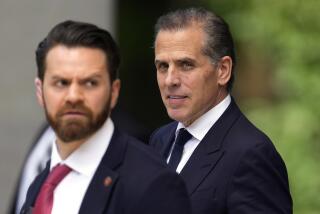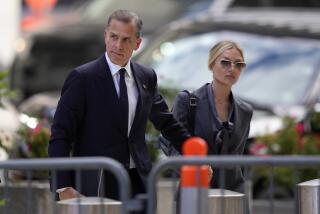For jurors, Libby case may pivot on matters of memory
- Share via
WASHINGTON — At I. Lewis “Scooter” Libby’s perjury trial, his lawyers have argued that pressing matters of state prevented the former vice presidential chief of staff from accurately recalling events. But the question of Libby’s guilt or innocence, which is expected to be in the hands of a federal jury today, may turn more on what he says he remembered, rather than what he says he forgot.
Again and again, meeting with the FBI and appearing before a grand jury, Libby recalled details of conversations with Vice President Dick Cheney and other administration officials. But when it came to discussions he had about the core issue in this case -- his involvement in disclosing the identity of a CIA officer married to an administration war critic -- he frequently drew a blank.
In closing arguments Tuesday, the government asserted that there was nothing wrong with Libby’s memory: His repeated lies, the prosecution argued, were part of a calculated cover-up.
“Ask yourself if that pattern is just a convenient way of avoiding the truth,” prosecutor Peter R. Zeidenberg said of versions of meetings that Libby recalled for investigators. Libby had “a great memory” when it came to remembering self-serving facts, the prosecutor said derisively.
Defense arguments
Defense lawyers strenuously rejected that characterization in their closing statements, attempting to shift the focus from Libby to prosecution witnesses -- principally three journalists -- whom they portrayed as the ones who were not credible and had memory problems.
Libby’s lawyers contended that their client had no motive to mislead anyone and that it made no sense for him to lie -- an action they said would jeopardize a long and distinguished career of government service.
“Scooter Libby’s innocent. He didn’t do anything. He didn’t leak anything,” said his lead attorney, Theodore V. Wells Jr. “Think about the madness of this prosecution.”
The pleas ended a month of testimony and argument in a case whose backdrop was the march to war in Iraq and accusations that the administration had twisted prewar intelligence.
The defense has sought to portray Libby as a sympathetic figure who, on the orders of his boss, Cheney, got caught up in a “meat grinder” of dealing with reporters that left him fearing that White House political operatives were conspiring to “scapegoat” him.
Prosecution’s side
The government has claimed that Libby’s actions were driven by another sort of fear -- realizing that he might have disclosed classified information about a CIA officer, Valerie Plame, whose husband had publicly criticized the way intelligence was used to justify invading Iraq. As a result, the prosecution argued, Libby chose to make up a story to cover his tracks.
Zeidenberg told the jury that the defense had failed to offer a shred of evidence to support the conspiracy theory. He said the testimony of a string of nine government witnesses proved that Libby was not credible.
“That’s not a matter of ‘misremembering’ or ‘forgetting,’ ” he said. “It’s lying.”
Defense lawyer William H. Jeffress Jr. responded that Libby did not behave like an ordinary criminal and had even produced notes, which proved helpful to the government, that “he would have ditched
Jeffress added that it made no sense for Libby to make up his central defense -- that he learned about Plame from NBC’s “Meet the Press” moderator Tim Russert -- because Russert was “the world’s most famous television newsman” who was bound to be questioned by investigators.
In their closing statements, both sides acknowledged the broad political issues underlying the case.
Wells pleaded with jurors not to allow their personal opinions of an unpopular war to affect their verdict.
“Don’t in this case sacrifice Scooter Libby for how you may feel about the war in Iraq or how you may feel about the Bush administration,” Wells said. “You give him a fair shake.... This is a man with a wife and two children.”
Special prosecutor Patrick J. Fitzgerald argued that Cheney’s office was behind many of the prewar claims that Iraq had stockpiles of banned weapons and that it had aggressively sought to silence critics. “Let’s talk straight,” he said. “There is a cloud over the vice president.”
Fitzgerald, who has rarely displayed even a hint of theatrics during the trial, opened his statement with an outburst.
“Madness! Madness! Outrageous!” he shouted, mocking the language of the defense attorneys who had sought to portray the case against their client as an overreach by a zealous prosecutor.
The jurors, surprised by the unexpected display, perked up noticeably. But their attention waned as Fitzgerald spent an hour reviewing evidence, often talking so fast that it was hard to make out his words.
Several jurors began to allow their eyes to wander, and one seemed to have trouble keeping her eyelids open.
Libby managed to disguise whatever anxiety he was feeling as the trial came to a close. He sat attentively at the corner of the defense table -- sometimes scribbling notes, but more often aiming his gaze directly at the attorneys making their closing arguments.
When Wells finished his remarks with an emotional flourish, Libby stepped over to pat him on the back, as if the attorney, rather than the defendant, was the one in need of consolation.
Fitzgerald, given the last word, closed by trying to remove any sympathetic impulse jurors might have for Libby, saying the defendant had owed the American people honesty in the Plame investigation, but instead had lied.
“He stole the truth,” Fitzgerald told jurors. “Get the truth back.”
*
greg.miller@latimes.com
*
Begin text of infobox
The CIA leak affair began to unfold in July 2003, around the time former Ambassador
Joseph C. Wilson IV wrote an opinion article in the New York Times attacking the Bush administration as twisting the intelligence it used to go to war in Iraq. In his January 2003 State of the Union address, President Bush said Iraq had sought uranium for nuclear weapons from Niger, in West Africa. Wilson wrote that, during his CIA-sponsored trip to Niger in 2002, he had found no evidence to support Bush’s claim -- and that the administration knew it. The White House soon afterward admitted that it should not have included the claim in Bush’s speech.
Eight days after Wilson’s article appeared, syndicated columnist Robert Novak wrote that Wilson’s wife, Valerie Plame, worked at the CIA and might have played a role in sending him to Niger. Disclosing the identity of an undercover CIA operative is illegal, and a criminal investigation was launched to find out who leaked the information.
No one was charged with leaking Plame’s identity. But in October 2005, a grand jury indicted then-White House aide I. Lewis “Scooter” Libby on charges of perjury and obstruction of justice.
Prosecutors said Libby told three reporters -- including
Judith Miller, then a New York Times staffer, who spent 85 days in jail for refusing to disclose her source -- about Wilson and Plame, but lied to investigators about it. Libby’s defense is that he didn’t lie but simply forgot the conversations because, as Vice President Dick Cheney’s chief of staff, he had been focused on more important national security matters at the time.
*
Source: Los Angeles Times
More to Read
Sign up for Essential California
The most important California stories and recommendations in your inbox every morning.
You may occasionally receive promotional content from the Los Angeles Times.













